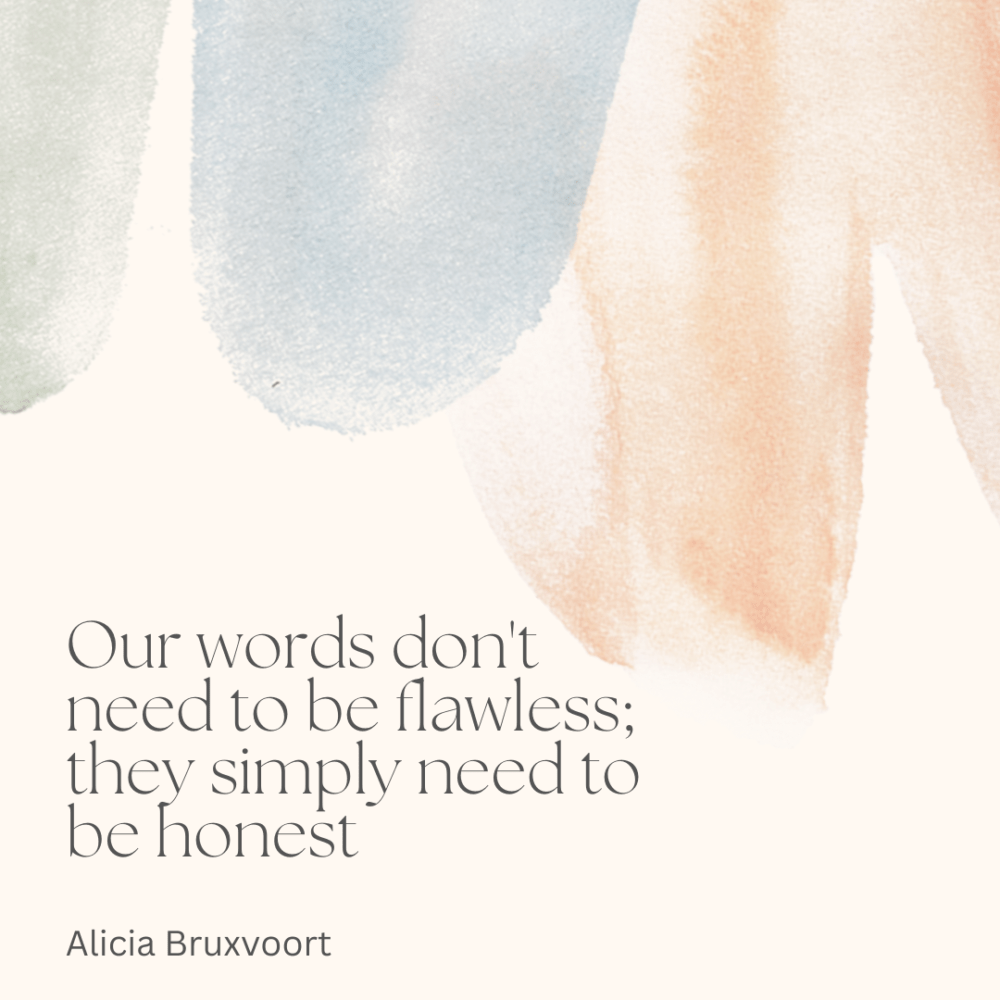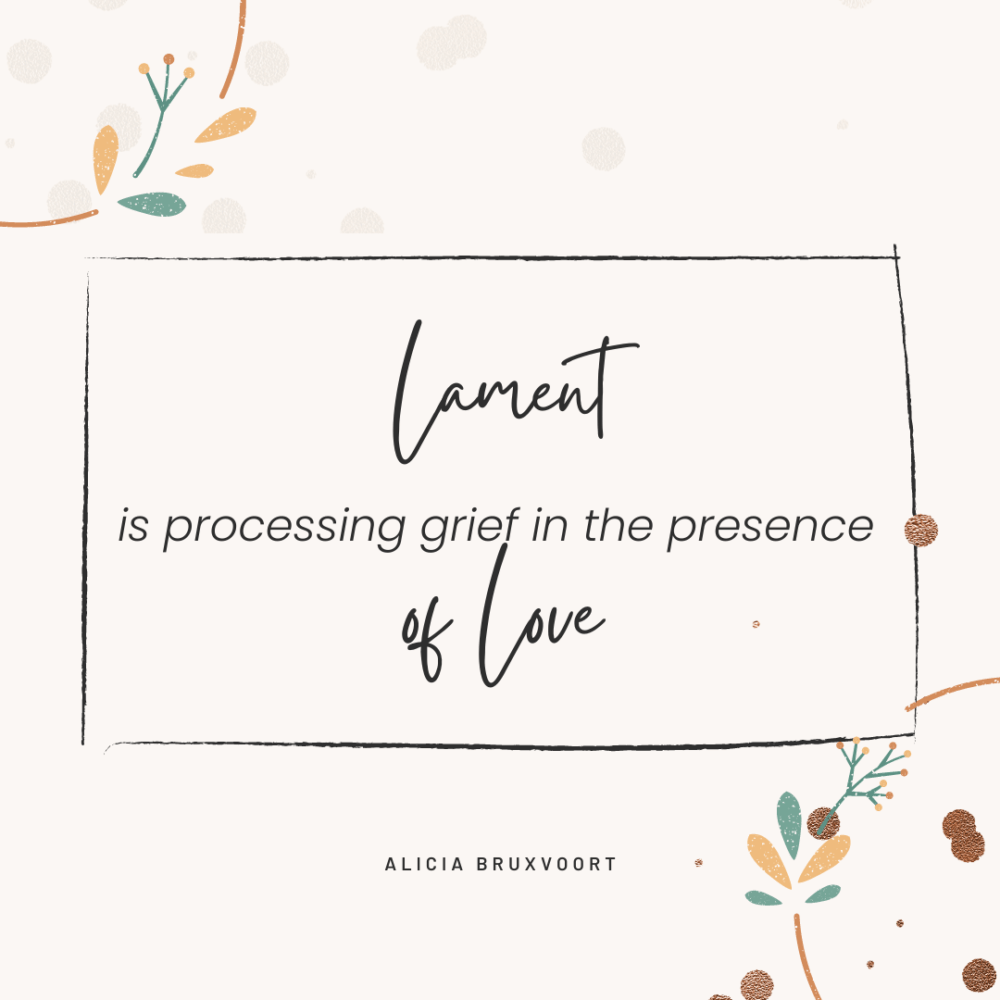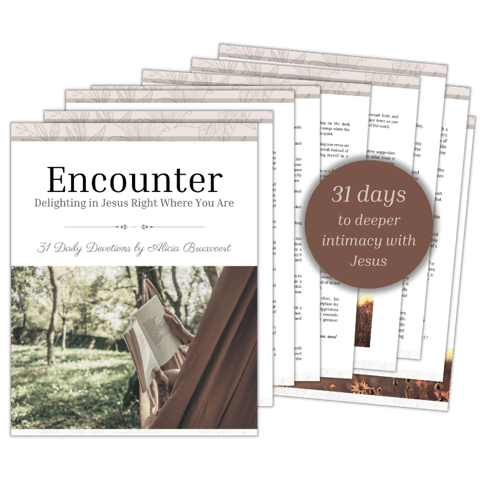It’s Ok If It’s Messy: Learning to Tell God the Truth

“It’s okay if it’s messy,” I reminded my students as they opened their spiral-bound notebooks and leaned over the crisp white pages. Some groaned and others giggled, but they all knew I wasn’t talking about their penmanship. Rather, my words were a nudge towards authenticity and courage.
Hands reached for favorite gel pens or rummaged through backpacks for deep-buried pencils. And soon the clanking cadence of the age-old furnace rose above the hum of wiggling legs and squeaky desks.
The twenty-seven teenagers crammed between the walls of my too-small classroom were my grandest joy and my greatest challenge. We didn’t share an unabashed love of literature or a whimsical wonder for the words. But we shared an unspoken agreement to learn and grow together.
These students didn’t show up each day because they were self-declared scholars or giddy book worms. They showed up because my class was their last chance to get the English credit they needed to graduate. More familiar with bitter bites of struggle than satisfying swigs of success, these were road-weary seniors. Accustomed to failing and falling along the rigid path of traditional education, they’d long ago stopped believing they were bright and gifted.
While other students were filling out college applications and chatting about campus visits, the ones entrusted to me were simply eyeing the finish line and articulating their burning desire to finally escape the narrow hallways of high school.
Our time together wasn’t seamless, but it was significant. We used literature to learn about ourselves and the world around us. But more importantly, we used words to explore the world within us—the big and little moments that had shaped us and instructed us, the quirks and qualms that were uniquely ours, the things that made us laugh and cry, wonder and wish.
We wrote about pet peeves and unmet expectations, hobbies and hopes, gains and losses. And as we shared a sliver of our days in room 202, I prayed that somewhere along this jagged path to graduation, my students would begin to see themselves as the wondrous and worthy humans they were. And, that maybe, just maybe, they would learn to dream again.
“I’d rather have honest words than flawless ones,” I murmured as I moved about the room making myself available for the writers in my midst.
“We know, we know….” said the young man with the quick wit and sassy spunk, spiked hair and deep blue eyes. He lifted his gaze from his notebook and flashed me an infectious grin. Then, in his best high-pitched ‘teacher voice’, he declared, “Life is messy. So is writing. But you are equipped to do both…”
The room burst into giggles as Mr. Blue-Eyes parodied the encouragement I’d often spoken over these students. He paraphrased my words (I wasn’t as dramatic as he made me sound) and punctuated them with his signature bravo (take a guess who the dramatic one was) and his classmates delighted in his theatrics.
I laughed along with my students and gave Mr. Blue-Eyes a nod. “When did you get so wise?” I asked.
“Just call me Dickens,” he bantered.
My eyes shifted to the corner of the whiteboard where the quote from the famous wordsmith was etched in blue Expo marker: There is nothing so strong or safe in an emergency of life as the simple truth. -Charles Dickens
We’d had many conversations debating the idea behind this wisdom, but in the end, what stayed with me was the response of the bushy-haired student in the back corner who rarely uttered a word. He was the one who often seemed to be sleeping his way through class, resting his head of unruly locks on his hands and closing his eyes now and then when he thought I wasn’t looking. But on that day when we’d put Dickens’ words in the center of our discussion, he’d lifted his head off his desk and joined in for a moment.
“@#$%&! It feels like all of life is an emergency.”
He’d said it without raising his hand, just loud enough for all to hear. And though his commentary was met with a moment of awkward silence (probably because of the four-lettered parenthetical expressions he’d used as an introductory clause), no one in our too-small classroom had argued his point.
Life has a way of feeling urgent and arduous. The teenagers in my class knew it, and so do you and I. Woven between the bewildering threads of beauty and the winsome strands of wonder are tattered strings of ache and agony, hardship and sorrow.
That’s why every Friday we pulled out our journals and pondered this hard and holy emergency called life. I didn’t tell students what to write or for whom to write. I simply invited them to be honest as they wrapped words around the things they carried, the truth they knew.
I never insisted on reading what they’d written. But as time passed, I often had students hand me those blue-lined pages as a gift of trust.
“I want you to read this,” one might say, while another would simply leave the journal on my desk, a folded corner creased to mark the words she wanted to share.
They weren’t performing for a grade or striving for extra credit, they were simply discovering the quiet relief and humble courage that comes from being honest enough to share the mess.

It’s those students I’m thinking about as I sit with my own journal in hand this morning and wrap wobbly scrawls around the disappointment I’ve been carrying.
My words are prayers on the page, but these are not the Sunday school prayers I learned as a wee one sitting in a circle around flannel-board Jesus. These words are raw and jumbled, bewildered and sad. They are protests, petitions, and pleas. These words are my heart on the page, messy but true.
The Bible calls this kind of conversation lament. And, thankfully, the book of Psalms is filled with examples of how to be truth tellers who trust God enough to bring the depth and breadth of our messy lives to Him.
The Psalmists recognized we aren’t made to bear life alone. We are crafted for communion with our Creator, built to share both the wonders and woes of this life with the One who knows the beginning and the end and refuses to abandon us in the messy middle.
The Psalmists’ laments remind us we don’t need to hide the heavy and hurting things from the One who sees our steps and knows our struggles.
Lament isn’t complaining about God. It’s being honest enough to bring our complaints to God. It’s not raging behind God’s back. It’s turning back to the One who is able to handle our anger and our questions, our discouragement and despair.
Lament is processing grief in the presence of Love.
It’s bringing our raw and vulnerable words to the One whose very words call out light from the darkness and call you and me His treasure (Dt 7:6). And just as my students learned in our too-small classroom long ago: Our words don’t need to be flawless. They simply need to be honest.
We can be forthright in our pain and candid in our confusion, because we don’t have a Father who merely tolerates our emotions; He crafted them. And through lament, He invites us to bring our whirling and wailing feelings to Him so we don’t drown beneath their current or hide behind their crest.
Lament may seem like a daring move toward a Holy God, but it’s an age-old practice rooted in relationship and fueled by trust. Lament doesn’t hold Love at an arms-length or sabotage intimacy with our Savior. It actually paves a path between our aching hearts and His.
So while the first glimmer of dawn breaks through the dark, I sit by the window with pencil in hand and follow the example of bold Truth-Tellers before me.
And as I bring my lament to Jesus, my messy feelings don’t repel my Savior. They beckon Him near. I am seen and less alone. Understood and tenderly known.
And He whose name is Faithful and True (Revelation 19:11) becomes the safest place for my wounded heart to linger.
It’s been over two decades since I shared my days with twenty-seven of my grandest joys and greatest challenges. But when I close the pages of my prayer journal, I can still see Mr. Blue-Eyes as he paused in the doorway at the end of our last class together.
And in the quiet of this brand-new morn, I can remember the lilt of gratitude in his voice as he bid me goodbye before he exited the narrow halls of high school for the very last time.
“Hey, Mrs. B…thanks for… Ummm…Being someone we can trust with our truth.”
I gave him a warm smile and he turned away when my eyes began to brim with tears. But as he headed into the hallway, he glanced over his shoulder and said with a laugh, “I guess old man Dickens was right after all!”
There is nothing so strong or safe in an emergency of life as the simple truth. -Charles Dickens
Jesus told him, “I am the Way—yes, and the Truth and the Life. -John 14:6.
Dear friends, thank you for spending time with me today. If you’re new here, welcome! If you’re an old friend, I’m so glad you stopped by again. Today in my devotion for Proverbs 31 Ministries I’m sharing a lesson I learned from a sad little girl and a wise ancient king. If you could use some encouragement to run towards God instead of away from Him when your heart is aching, I wrote the message for you. You can find it here.
It’s my prayer that the words I write stir a longing in your heart to know Jesus more intimately and pursue Him more intentionally. If you’d like some help talking with Him about your feelings and frustrations, your disappointments and your complaints, I’ve created a resource for you called “Learning to Lament.” You can find the free download here. Grab one for yourself and for a friend!
Also, if you want to hear more about how to draw near to Jesus when your heart is aching, I hope you’ll listen to the conversation I had with my dear friend, Katy McCown. During our candid chat on a recent episode of The Best Day Ever Podcast, I share what I learned from an unexpected season of lament. I talk about how we can bring our disappointments to Jesus, and I divulge the surprising thing I’m discovering about intimacy with Jesus when life doesn’t make sense. I’d love for you to chime in on the conversation. So don’t hesitate to let me know how Jesus is meeting you in the midst of your imperfect and unfinished story, too.
Finally, if you enjoyed what you read today and you’d like to receive more encouragement in your inbox, feel free to subscribe to this blog and join our community of hope dwellers as we pursue Jesus together.




Alice, you are one of my favourite writers. I love your stories and you always being a smile to my face. God has given you a such a gift. I feel like I am sitting across from you having a coffee every time I read one of your devotional. Blessings to you.
Awww, thank you, Donna, for bringing a smile to MY face. I’m so honored that you read the words I write. My prayer is always that these scribbles connect us to one another and to Jesus, so if it feels like a virtual coffee date, I trust God is answering those prayers. Truly grateful for you!
Thanks for anyways bringing me a smile and encouraging words that I am ‘normal’ in a bit so ‘normal’ world! Love you dear friend!
Jen, I miss our in-person chats (because a haircut with you was always SO MUCH MORE than a haircut :))! So grateful to cross paths with you here for a minute. Praying for you right now and sending you a big hug, friend.
Most of the time, I don’t trust my own words. Who am I trying to impress? God? He knows, everything. He knows I am a mess. Grateful doesn’t come close to how I feel for Him, about Him. He knows and accepts. I don’t have to try to impress. Obey and trust. Oh blessed assurance.
Oh, Sheri, I totally understand that feeling of not trusting my own words. Like you, I’m thankful we have a God who welcomes us messy words and all. I am so grateful we don’t need to impress Him! Such comfort in that sweet truth. Thanks for taking time to remind all of us of that “blessed assurance.” 🙂
Beautifully written as usual. Life is indeed by nature messy yet there is always a perfect purpose within the messiness of every believer. And when God looks down He is so focused on the invisible beauty behind the adversity. He has amazing power that holds Him back from instantly taking away the pain when we are suffering, and He did the same with His own child. But look what that did for us all. Maybe because He can see that in the end everything will be okay. Like David we must believe that we will see the goodness of the Lord even when we cannot fathom how. Blessings.
“The invisible beauty behind the adversity…” Oh, how I love that! Yes and amen.
What a wonderful gift you have and thanks for sharing. I’m a hope dweller and story teller myself (great identifier). Love to just “soak” in your stories of hope and joy. I find that by ruminating in the goodness and mercy of God the father the way forward seems clear. Thanks again for sharing!
Sue, Welcome! I love to meet other hope dwellers and storytellers. Thanks for lingering here a bit. I love the word you chose—ruminating—as you spoke of focusing on the goodness of God. I have been practicing the habit of “rehearsing His faithfulness,” but today I’m going to “ruminate” on His goodness and mercy. Thanks for the nudge to do so.
How I have missed your words.
I would love to be your student like when they learned this:
“But more importantly, we used words to explore the world within us—the big and little moments that had shaped us and instructed us, the quirks and qualms that were uniquely ours”
A couple days ago I told a friend we need more truth-tellers.
Expo marker: There is nothing so strong or safe in an emergency of life as the simple truth. -Charles Dickens
Your words are like music.
Thank you for coming back and sharing the truths God has laid out for you.
Oh Jane, THANK YOU for your sweet words and lavish encouragement. It’s been a while since I’ve put words together in this space and I’ve missed you and all the other lovely Jesus- seekers gathered here. Thanks for being patient as I found my way back. It’s wonderful to connect again. Much love–
You are an amazing writing with a lot to say!
Thank you for taking time to read my scribbles, Michelle. So nice to cross paths here:)